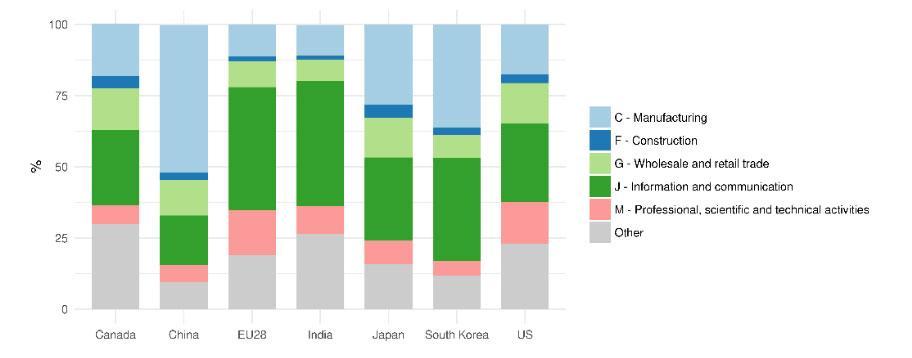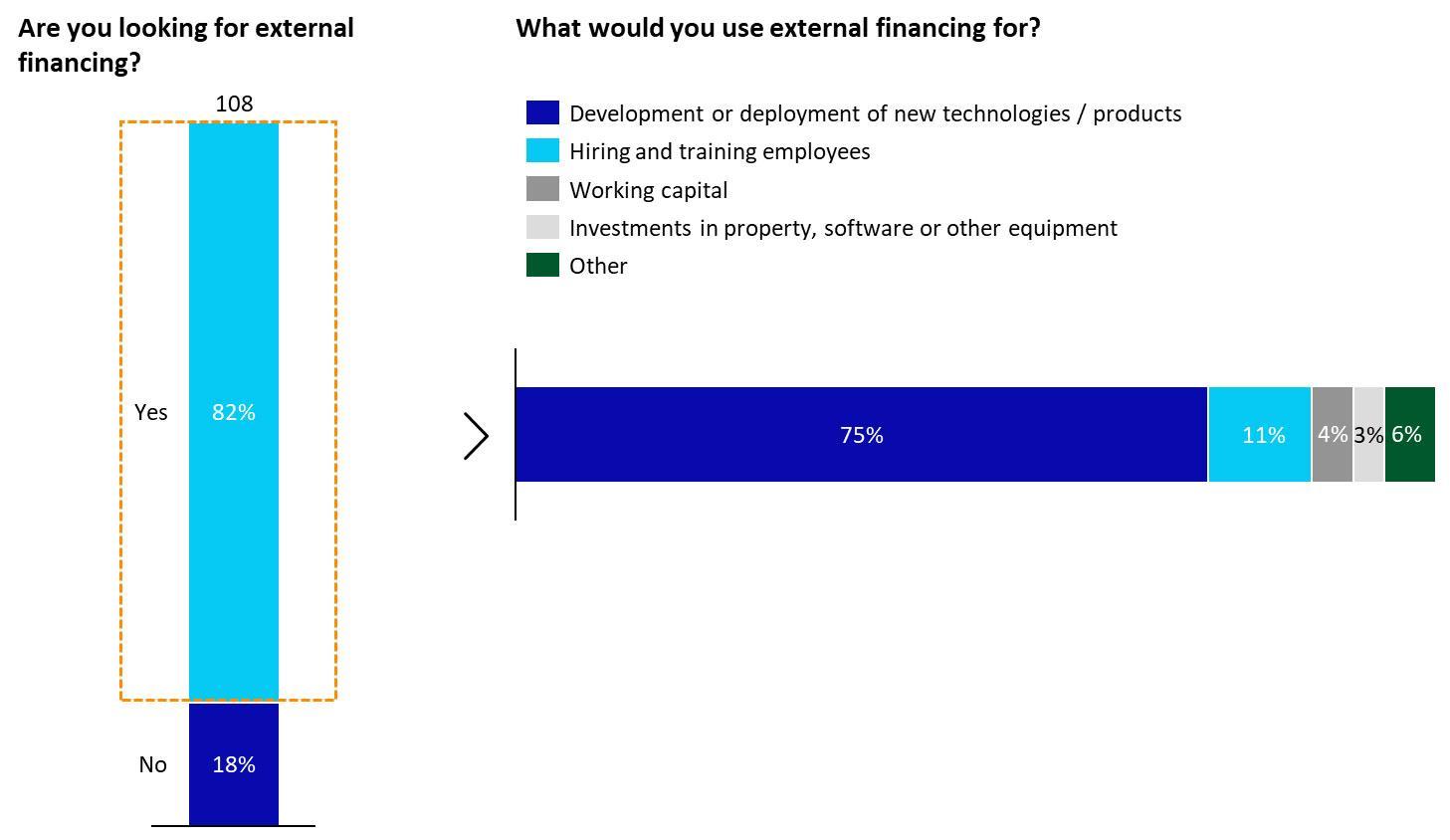Artificial intelligence (AI) and blockchain are two of the most significant disruptive technologies of our time, set to have a major impact on future societies and economies. But the European Union accounts only for 7% of annual equity investments in both technologies, while the US and China together account for 80%. However, the EU excels in research and has the largest pool of digital talents.
Artificial intelligence, blockchain and the future of Europe: How disruptive technologies create opportunities for a green and digital economy, a report conducted by the European Investment Bank and the European Commission, recommends that Europe needs to step up its efforts to address the estimated €10 billion investment gap that is holding back development and deployment of artificial intelligence and blockchain technologies in the EU.
What are AI and blockchain?
Artificial intelligence is the theory and practice of building machines capable of performing tasks that seem to require intelligence. Currently, cutting-edge technologies that strive to make this a reality include machine learning, artificial neural networks and deep learning.
Blockchain is a new filing system for digital information, which stores data in an encrypted format. It is a transparent and decentralised way of recording lists of transactions. Data is encrypted and distributed across many different computers, enabling tamper-proof, highly robust databases that can be read and updated only by those with permission.
Simply put, artificial intelligence may be considered as the “thinking” part, and blockchain as the “remembering” part. Combining the technologies presents opportunities to create new products, services, assets or even forms of governance.
Why Europe needs to close the gap
As transversal technologies, AI and blockchain may transform a wide range of sectors and will likely play central roles in the success of Europe’s green and digital transitions, as well as in strengthening its technological sovereignty.
Without investment, regions lagging behind in the AI race will probably see diminished global market shares in several industries, from finance and e-commerce to manufacturing and mining.
Investments in research and development (R&D) for AI are also crucial for security and defence, so underinvestment could undermine Europe’s national security. AI is expected to have a significant impact on progress towards achieving the Sustainable Development Goals (SDGs), especially on climate but also on diversity and inclusion, notably “gender smart” technological development.
Main findings
The report shows that in comparison to major global competitors the EU is falling behind in the development and application of artificial intelligence and block chain technologies. To catch up, however, the EU can build on a leading role in high-quality research and its vast pool of digital talents.
The study identifies three major areas that the EU needs to address in its artificial intelligence and blockchain landscape. The challenges identified include:
- development,
- deployment in the market, and
- the wider EU innovation ecosystem.
The study also highlights the lack of available financing for the creation and scale-up of EU businesses. Another challenge concerns the take-up of the deployed technology by the market. And to further develop scale, European innovation hubs need to be better connected to increase the flow of talent, experience and funding access.
In fact, companies and governments in Europe are substantially underinvesting in AI and blockchain compared to other leading regions. It has become clear that the European Union struggles to translate its scientific excellence into business application and economic success.
Total estimated VC equity investment in AI and BC SMEs by geography, 2010–2019
Compared to other major economic systems, there are no fundamental structural differences in the economy of the European Union that could justify lower business demand to deploy these technologies and take up digital transformation. However, the United States and China together account for over 80% of the €25 billion of annual equity investments in AI and blockchain technologies, while the EU only accounts for 7% of this global amount, investing around €1.75 billion.
Europe’s venture capital (VC) ecosystem seems to mainly provide early-stage finance for AI/blockchain-based small and medium-sized enterprises (SMEs) (10% of total venture capital investments in the European Union, compared to 5% in the United States), but clearly underperforms in subsequent rounds of financing (expansion and growth stages).
While virtually all sectors in the EU economy are embracing AI technologies, deployment has been more systematic in certain sectors and the application of AI varies across jurisdictions. In Europe, the United States and India, a relatively large share of AI firms operate in information and communications or in professional, scientific and technical activities. By contrast, in China, about half of the country’s AI firms operate in the manufacturing sector, mirroring the overall strength of China in the manufacturing sector. Japan presents a more balanced distribution of AI firms across different sectors; in particular, more than 25% operate in manufacturing and a prominent share in wholesale and retail trade, which is similar to the situation in the United States and Canada.
AI firms by economic sector (%), 2009–2018
All major world economies, including the European Union, are racing to achieve a leading global position in the development and deployment of AI and blockchain.
Europe, despite its scientific excellence, lags behind in particular on the financing front. Emerging startups need more firepower to compete globally. Ecosystems need to be strengthened and more connected in order to translate ideas into commercial value.
The European Commission has taken several measures to advance these technologies: the Horizon 2020 programme allocated €1.5 billion to AI in 2018–2020; the Digital Europe Programme (DEP), as part of the 2021–2027 Multiannual Financial Framework (MFF), will complement this by dedicating an additional €2.5 billion to investing in and opening up the use of AI by businesses and public administrations.
On the investment front, the European Investment Bank (EIB) launched a €150 million co-investment facility to invest alongside fund managers and private investors backed by the European Investment Fund (EIF), while the EIF recently launched a pilot for a dedicated AI and blockchain investment scheme of €100 million. Beyond such dedicated funds, the European Commission has made additional resources available under the new Multiannual Financial Framework and the post-pandemic NextGenerationEU programme, particularly the Recovery and Resilience Facility (RRF), which will be deployed with particular attention to strategic technologies.
Analysis, survey and interviews have identified several bottlenecks constraining access to finance for AI and blockchain companies in Europe.
On the demand side, it is critical that small businesses have the right talent to push innovation and produce high-quality R&D, and can scale up their products in a unified digital market. But on the supply side, venture capital investors, banks and other financial providers need to have sufficient capital for investing, the right tools to assess complicated technologies, and the willingness to invest in them.
AI and BC SMEs seeking external financing (SME survey results)
Besides supply and demand, the study also examined the market matching system, which brings together small and medium firms and investors to the benefit of all parties. Finally, the study analysed the overall innovation ecosystem and its value chain, in which all players need to cooperate in a coordinated manner, with government initiatives having a central role in defining strategy, and prioritising and enabling the cooperation of such key players.
Total number of AI and BC SMEs per 1 million workers, April 2020
About the InnovFin Programme
InnovFin – EU Finance for Innovators is a joint initiative launched by the European Investment Bank Group (EIB and EIF) in cooperation with the European Commission under Horizon 2020. InnovFin aims to facilitate and accelerate access to finance for innovative businesses and other innovative entities in Europe.
InnovFin Advisory helps eligible public and private counterparts improve the bankability and investment-readiness of large, complex, innovative projects that need substantial long-term investments.




